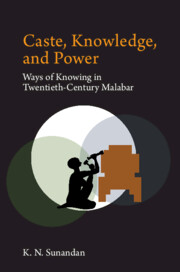
Dr. K. N. Sunandan, a 2012 graduate of the History doctoral program, has published a monograph with Cambridge UP. Titled Caste, Knowledge, and Power: Ways of Knowing in Twentieth Century Malabart, the book investigates how knowledge has contributed to the transformation of caste practices over the course of twentieth-century India. Sundandan teaches at Azim Premji University in Bangalore, India. Read the full description of his new book below.
Caste, Knowledge, and Power investigates the transformations of caste practices in twentieth century India and the role of knowledge in this transformation and in the continuing of these oppressive practices. The author situates the domination and subordination in the domain of knowledge production in India not just in the emergence of colonial modernity but in the formation of colonial–Brahminical modernity. It engages less with the marginalization of the oppressed castes in the modern institutions of knowledge production which has already been discussed widely in the scholarship. Rather, the author focuses on how the modern colonial–Brahminical concept of knowledge invalidated many other forms of knowing practices and how historically caste domination transformed from the claims of superiority in acharam (ritual hierarchy) to the claims of superiority in possession of knowledge.